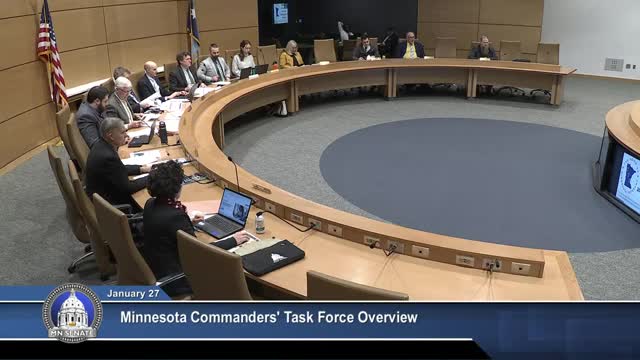Commanders Task Force and county officers push licensing, tax-exemption and anti-'claims-shark measures
Get AI-powered insights, summaries, and transcripts
Subscribe
Summary
Leaders of Minnesota veterans service organizations told the Senate subcommittee on Jan. 27 they will press legislative priorities including hunting-license discounts for disabled veterans, updated property-tax exclusions, a state anti-'claims-shark measure requiring VA accreditation for paid representatives, and expanded meals support.
Leaders of Minnesota's veterans service organizations told the Senate subcommittee on Jan. 27 they will press a narrow set of legislative priorities aimed at expanding access and protecting veterans from fraud.
"I'm doctor Krahar Moon. I am the department commander for the American Legion for 2024, 25, and I'm also the chairman of the Commander's Task Force for Minnesota," said Dr. Krahar Moon as he introduced the Commander's Task Force (CTF) agenda. Christy Janigo, the American Legion's legislative chair, and John Baker, executive director of the Minnesota Association of County Veterans Service Officers (MACVSO), summarized the coalition's proposals.
The CTF presented five central priorities: (1) preserving a separate, bipartisan veterans omnibus bill to consolidate veterans-related legislation; (2) reduced-cost hunting, fishing and trapping licenses for veterans with service-connected disability ratings of 50% or greater and resident pricing for out-of-state veterans when hunting in Minnesota; (3) modernization of the disabled market-value property-tax exclusion (proposing an increase in caps and indexing to inflation and technical clarifications for surviving spouses); (4) a state-level anti-'claims-shark statute that would require paid representatives handling VA claims to obtain VA accreditation and extend disclosure requirements; and (5) funding to expand meals and food supports for veterans, with a $500,000 annual appropriation proposed to expand Lutheran Social Services'Core meal delivery outside the Twin Cities.
Janigo said discussions with the Department of Natural Resources had moved license-cost estimates and that a $3 figure on CTF slides was negotiating toward about $5 for the reduced-cost veteran license. On the disabled market-value exclusion, the CTF proposed raising the exclusion caps to $200,000 (from $150,000) at higher partial disability bands and to $400,000 (from $300,000) for 100% permanent and total service-connected veterans; they also seek indexing and technical fixes to allow surviving spouses to retain benefits after downsizing or remarriage in some circumstances.
The anti-'claims-shark measure grew out of concerns that commercial promoters already approach elderly veterans and survivors with offers that charge for services that county veteran service officers provide for free, MACVSO officials said. John Baker described frequent contacts to CVSOs about cases where families paid for services they could have received without charge and said county officers are the primary local point of contact for benefits, burial coordination and referrals.
MACVSO said it represents 165 county veteran service officers working in all 87 Minnesota counties. The association asked the legislature to fund technical-assistance coordinators (two named specialty tracks: justice-involved veterans and women veterans were cited) and requested $20,000 each for coordinators to deliver training and support for CVSOs in smaller or rural counties. MACVSO leaders said CVSOs do not receive federal block grants to perform benefits outreach and that the association relies on state grant and county funding to support local offices.
Commanders Task Force leaders also highlighted charitable-gambling revenue as an ongoing concern for posts that fund veterans services, saying prior changes that capped certain fees and altered game structures had reduced revenue for some posts and that additional tax relief is still needed.
Why it matters: The CTF and MACVSO represent major veterans organizations and the CVSO network that handles frontline claims assistance and benefits access. Bills on licensing, property-tax exemptions and anti-fraud measures would directly affect veterans'costs, tax liabilities and protections against unscrupulous paid representatives.
Ending note: CTF and MACVSO leaders told the committee they will coordinate with MDVA and county assessors to refine bill language and asked lawmakers to advance the proposals during the session.
